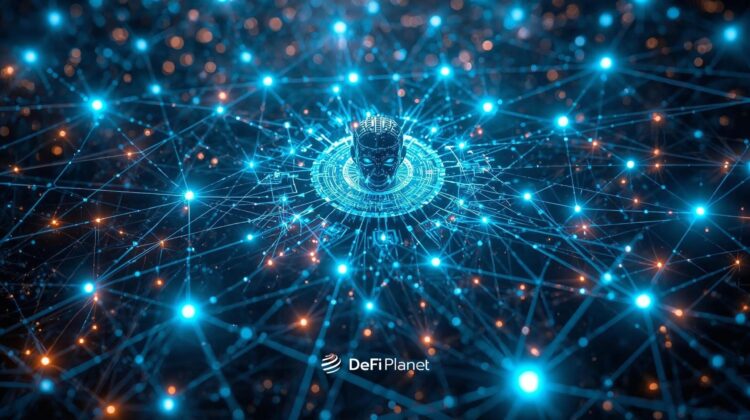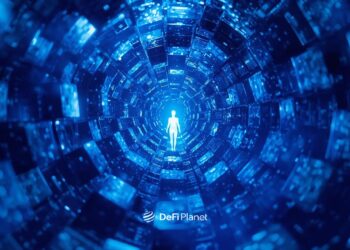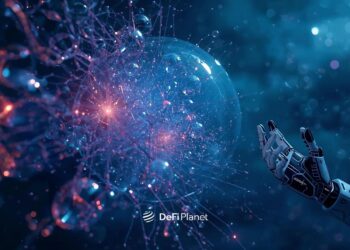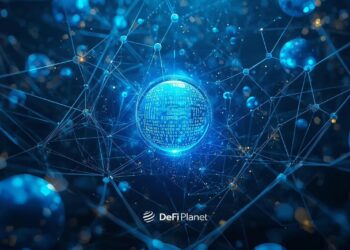AI needs massive amounts of data and computing power to learn and improve, but gathering this data and running complex training processes is expensive and often relies on giant cloud providers. A new idea is emerging in Web3 infrastructure: decentralized computer networks powered by crypto rewards and data incentives. The market for blockchain-AI integration has shown remarkable growth potential. Current projections indicate the market could reach $1.88 billion by 2029, expanding at a compound annual growth rate of 28%. These systems aim to build fair and open AI training marketplaces, and here’s how they work.

Decentralized Compute and Token Rewards
One prime example of this emerging trend is NodeGoAI, a cutting-edge platform that operates as a decentralized compute marketplace. It allows everyday users to rent out their unused CPU or GPU power to help train AI models or render digital graphics, thereby earning crypto rewards in the form of $GO tokens in return. This means your personal computer, gaming rig, or even unused server space can become part of a global AI training marketplace, earning passive income while contributing to the next generation of intelligent systems.
NodeGoAI runs on a trust-minimized system called proof-of-replication, which verifies that each node (user’s computer) has truly performed the assigned tasks before receiving any rewards. This ensures quality performance, prevents cheating, and makes the entire system more secure. The protocol handles crypto rewards fairly, with $GO tokens distributed automatically by smart contracts based on the amount of compute power contributed and task completion accuracy.
To make onboarding easy, NodeGoAI offers a user-friendly Chrome extension that lets anyone join the network; no developer skills required. This plug-and-play approach opens the door for wider participation and pushes Web3 infrastructure further into the mainstream.
What makes NodeGoAI even more community-driven is its plan to implement DAO governance (Decentralized Autonomous Organization). This will allow users and contributors to vote on how the platform evolves, such as adjusting reward rates, setting compute benchmarks, or choosing which types of AI workloads to prioritize. It’s a model that combines data incentives, crypto economics, and community ownership, putting power into the hands of its user base, not centralized corporations.
This kind of innovation is exactly what Web3 infrastructure aims to promote: a decentralized, fair, and permissionless system where anyone with a computer and an internet connection can participate in building the future of AI and with rising demand for training powerful models, and the cost of cloud compute soaring; platforms like NodeGoAI present a viable alternative that democratizes access and rewards every contributor.
Data Incentives and Secure Sharing
AI doesn’t just need powerful computers, it also needs a lot of good, high-quality data to learn and improve, and platforms like Ocean Protocol help make this possible. They let people and companies share or sell their data, and in return, they get paid with cryptocurrency. This is called a data incentive, and it means you get rewarded when you share useful data.
One of the most interesting parts is that you don’t need to know or trust the person you’re sharing data with. This is because blockchain technology ensures everything is secure and honest. It keeps track of who owns the data, who uses it, and makes sure no one can cheat. This kind of system is called trustless sharing, because trust is built into the technology itself.
This setup is useful in many areas like healthcare, education, and business. For example, doctors can share medical data (without names) to help researchers build better tools. Or a company can sell weather data to help AI predict natural disasters. Everyone benefits: the person sharing the data gets paid, and the person using the data gets better results.
In the future, more and more people might earn money by sharing useful data from their phones, fitness trackers, or smart home devices, helping AI get smarter while keeping things fair, safe, and private.
The Biggest Concerns Customers Have About Giving Away Their Data
Despite the clear benefits listed above, customers are still concerned about data privacy. In many cases, rightfully so. Here are the main issues you should prioritize as a brand to always clarify and handle in a law-abiding and transparent way, to alleviate your customers’ concerns regarding data handling:
- Privacy issues: How do companies actually track customers’ actions? What type of data is collected? How is it stored and for how long?
- Data usage: What happens with the data customers agree to provide? How exactly is the company going to use it? Why should they consent in the first place? What do customers gain (besides ad pop-ups?)
- Giving away their data to other companies: Who gets access to the provided data? Will it be sold – undisclosed – to marketing agencies, telco companies, or any other third-party members, who can use it for their own goals?
Especially in the US, social media platforms and tech providers have been under scrutiny in connection with their privacy policies and user data collection in the past couple of years, both by government parties and app users.
In light of everything we’ve shared so far, the question presents itself: What is the best and most beneficial way to build trust and collect invaluable insights in a way that satisfies the interests of both parties? Most often, bands collect zero- and- first-party data using surveys, questionnaires, feedback forms, or customer profiles. But many customers skip these, either because they dislike sharing their information or simply don’t want to spend the time doing so.
Federated & Decentralized AI Ecosystems
Federated AI ecosystems are designed to enable collaborative model training while preserving data privacy. In this setup, the AI model is trained across multiple independent devices or institutions, such as smartphones, hospitals, or banks, without transferring their raw data to a central server. Instead, each participant trains the model locally and shares only the resulting model updates or gradients, these updates are then aggregated, typically on a central server to improve the global model.
This approach is especially valuable in industries like healthcare or finance, where data is highly sensitive and regulated. Federated learning ensures that data remains within its original environment, reducing exposure risks while still contributing to shared model improvements. Although coordination is often still managed by a central authority, federated AI represents a significant shift toward more privacy-conscious machine learning.
In contrast, decentralized AI ecosystems take the concept further by removing the need for any central authority altogether. These ecosystems rely on blockchain technology, peer-to-peer networks, and cryptographic tools to distribute not just the training process, but also data storage, compute power, and governance. In decentralized AI, multiple independent nodes contribute to and verify AI workflows, with smart contracts managing the coordination and rewarding participants through token-based incentive mechanisms. Unlike federated learning, which may still operate behind closed doors, decentralized AI emphasizes transparency, auditability, and open participation.
All interactions, from data contribution to model output can be recorded on-chain, allowing for a fully traceable and trustless AI development environment. This is especially relevant in Web3 contexts, where autonomous agents, decentralized compute markets, and community-governed AI services are emerging as new paradigms for artificial intelligence.
Together, these two models, federated and decentralized, illustrate how AI development is evolving beyond traditional centralized control, toward systems that are more secure, ethical, and inclusive. While federated AI addresses privacy through controlled collaboration, decentralized AI reimagines the infrastructure itself, embedding trust and accountability into the foundation of intelligent systems.
Why It Matters
This new way of building AI systems matters because it opens the door for more people to take part. Anyone, anywhere, can earn tokens by offering their computer power or useful data, instead of big companies doing everything; individuals can now contribute and get rewarded fairly.
When more people join in, AI models become better because they learn from a wider range of data, which can lead to fairer and more accurate results. At the same time, using blockchain means that every action, like sharing data or completing a task, is recorded publicly and this creates transparency and helps build trust, since anyone can check and confirm who contributed.
Challenges Ahead
Even with all these benefits, there are still some challenges to solve. One big issue is quality control, figuring out how much each person’s data or computing power is really worth. It’s also difficult to manage work across so many different computers, which can make the whole system slower and more complicated. Another challenge is verification; making sure that the AI work was done correctly without making the system too slow or expensive to use. These are problems developers are working to fix as this technology grows.
Blockchain‑powered AI training marketplaces that combine decentralized compute, data incentives, and crypto rewards are opening a new way forward. They could change AI from a field controlled by big tech into a global community project where anyone can contribute and benefit. Still, verifying contributions, ensuring quality, and keeping the system fair remain big hurdles and if these challenges are solved, we’ll be closer to building Web3 infrastructure that supports inclusive, transparent, and community-driven AI.
Disclaimer: This article is intended solely for informational purposes and should not be considered trading or investment advice. Nothing herein should be construed as financial, legal, or tax advice. Trading or investing in cryptocurrencies carries a considerable risk of financial loss. Always conduct due diligence.
If you want to read more market analyses like this one, visit DeFi Planet and follow us on Twitter, LinkedIn, Facebook, Instagram, and CoinMarketCap Community.
Take control of your crypto portfolio with MARKETS PRO, DeFi Planet’s suite of analytics tools.”





















